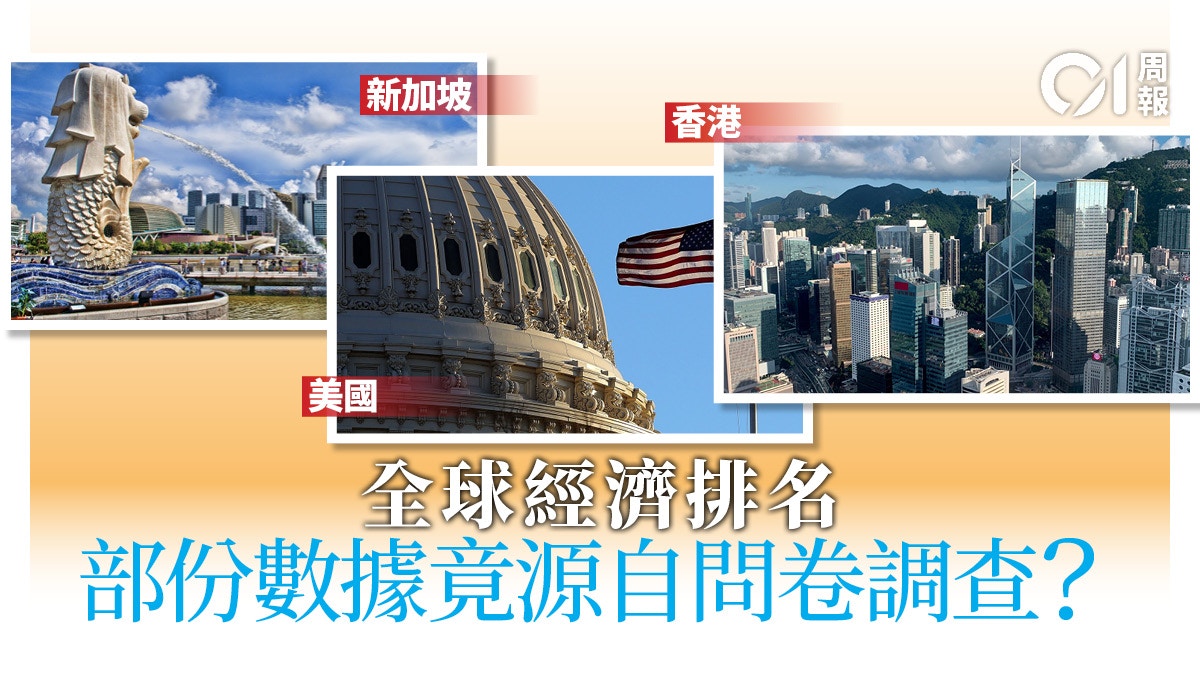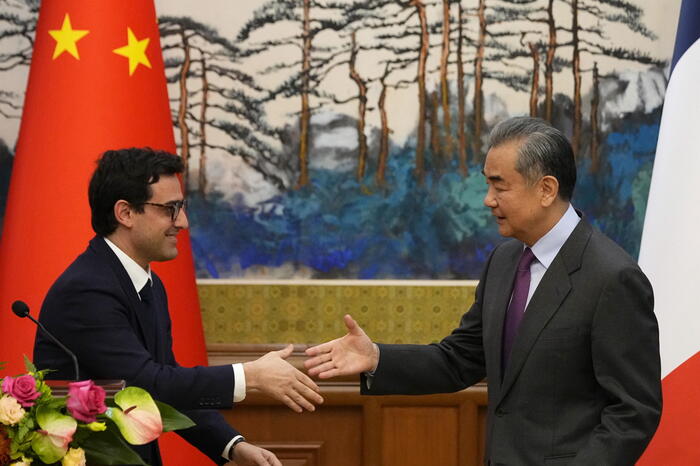weekly
Written by: Chen Xunlin
2020-09-28 15:33
Last update date: 2020-09-28 15:33
The Swiss "World Economic Forum" (WEF) has reviewed the competitiveness of different economies since 1979 and regards long-term economic growth and productivity as important indicators for measuring competitiveness.
With reference to the definition of WEF, competitiveness is the system, policies and factors that determine the level of productivity. In order to make the index closer to the trend of the fourth industrial revolution, WEF more accurately assesses the development status of various economies, starting in 2018 Switch to new indicators and evaluation methods, formulate the "Global Competitiveness Index 4.0" and rank based on it.
To undertake the above: [Competitiveness.
1) Neoliberalism is in crisis, don't be led by economic ranking
In the "Global Competitiveness Report 2019" published in October last year, WEF evaluated 141 economies, scoring 12 pillars in four categories: environmental convenience, human capital, market, and innovation ecology (Table 2) These pillars are composed of 103 independent detailed indicators, and their average scores are taken.
However, each pillar accounts for about 8.3% of the overall score, and each pillar contains detailed indicators with different weights. However, the document does not explain how to determine the proportion of weight.
For an economy, all pillars are important because they can affect the economic environment in different ways. WEF uses different weights to help the economy understand its own socio-economic development status and encourage priority issues that restrict its economic development. Carry out policy reforms to enhance international competitiveness and future development potential.
In the 2019 report, Hong Kong ranked third, up four places from 2018, Singapore replaced the United States as the world's most competitive economy, and the United States dropped to second.
WEF's data sources are divided into two parts: refer to the statistical data of other international organizations, academic organizations and non-governmental organizations such as the International Monetary Fund (IMF) and the World Health Organization (WHO); if certain statistical data cannot be collected or measured For example, "Judicial Independence" and "Skills Gap", WEF will conduct an Executive Opinion Survey, and issue questionnaires to senior business managers in each economy, asking respondents to assess their development status and use 1 Score to 7 points to supplement different indicators to better evaluate productivity.
Among 103 small indicators, 44 indicators are derived from the results of questionnaire surveys, accounting for about 43%.
WEF completes the questionnaire survey in the first quarter of each year, and then calculates the scores in a two-year weighted form. For example, the 2019 report will use the average of the questionnaire data for 2018 and 2019, but can this be a true assessment of the whole picture?
In the Global Competitiveness Report 2019, Singapore replaced the United States as the world's most competitive economy, and the United States fell to second place.
(Data Picture/Reuters)
In fact, WEF distributed questionnaires in 139 economies in 2019. Among them, 134 economies were able to provide sufficient effective responses, and a total of about 12,987 valid questionnaires were received. However, the sample size of the questionnaires of the economies is quite different: Gabon The number of respondents was the least, with only 33 respondents. Angola, with the largest number of respondents, had 352 respondents, 10 times that of Gabon, while Hong Kong had 89 respondents.
The "Global Competitiveness Report and Economic Freedom" published by the International School of Management (IMD) in Lausanne, Switzerland in June this year is a relatively recent report that analyzes the competitiveness of 64 economies around the world in various aspects and examines their development. Pros and cons.
The report measures the competitiveness of each economy based on the average performance of the four major competitiveness factors: government efficiency, business efficiency, economic performance, and infrastructure construction (Table 3), and sets five detailed indicators under each sub-indicator.
Similar to WEF, IMD not only bases on the statistical data of local governments and civil organizations (accounting for two-thirds), but also uses the results of questionnaires filled out by the business community. The sample size is determined by the GDP of the economy.
In the latest report, Singapore continued to win the championship, followed by Denmark, Switzerland, and the Netherlands. Hong Kong fell from second place last year to fifth.
However, the scientific logic of quantitative data is far from that of qualitative data.
Deng Xiwei, a professor of economics at the School of Economics and Business Administration of the University of Hong Kong, said frankly that the use of survey results to fill data is full of blind spots. If the data is treated rigorously, the questionnaire can only be used as a reference.
From the perspective of academic research, the more energy the indicators are, the better. Even though the economies of scale are different, such as the ratios of per capita GDP, the concepts and criteria can be compared at the same level.
Deng Xiwei also said that although the questionnaire is "close to the ground" and not only blindly following the data, the sample size and response rate can also affect the results, and the responses to the questionnaire are also subjective. "Bias can come from personal perceptions, and secondly, how to choose respondents. As for the response rate to be acceptable, we may not be able to observe this (from the results of the questionnaire).” Bias may be due to the fact that the interviewee is not familiar with a certain category and therefore gives a more conservative answer, so if the sample collected is not representative No matter how the data is processed, the results cannot be avoided.
Deng Xiwei said that the use of questionnaires to fill in data is full of blind spots.
(Photo by Huang Shuhui)
The default position leads to judgment before trial?
The Heritage Foundation proposed that economic freedom is the basic right for everyone to control their own labor and property, that is, to freely produce, consume, and invest. The government will also allow labor, capital, and commodities to flow freely, avoiding restrictions on freedom.
Economic freedom can bring about higher economic growth, create a more ideal, stable and clean social and economic environment, and also have higher per capita wealth and eradicate poverty. The indicators among them are directly proportional to the degree of economic freedom and prosperity.
The foundation believes that "government expenditures" can take many forms. Among them, providing infrastructure, funding research or improving human capital can be regarded as investment and provide society with a reasonable price; but all government expenditures must ultimately be borne by higher taxes. Opportunity costs are generated, and private enterprises have surplus resources; and government bureaucracy will only reduce production efficiency. Therefore, the foundation will limit "government spending" as one of the factors that promote freedom.
These evaluation methods only start from economic indicators such as market dominance and trade, and often ignore the impact of social and environmental factors on competitiveness, and there are many presuppositions and value judgments.
A paper in the Journal of Business Ethics published by the well-known academic publishing house Springer pointed out that some of the questionnaire questions and conclusions are driven by ideology rather than substantive evidence.
For example, in the "8.02 Hire and Dismissal" indicator, the question is: "To what extent does the law in your country allow companies to flexibly hire and fire employees?" The higher the tolerance, the higher the score. The hypothesis behind the paper is wrong , Because there is no evidence to prove that flexible hiring or dismissal will damage competitiveness. On the contrary, excessive employee turnover will increase the recruitment cost of the enterprise, and also incur dismissal and increase administrative expenses. At the same time, it will affect the morale of employees and reduce competitiveness in disguise.
The paper also puts forward an argument that high-performance companies will regard employees as their greatest asset and provide them with training, so they rarely fire employees; moreover, the ease of dismissal by law does not mean that companies will get worse, as in Germany in the 1990s The dismissal laws were relaxed, but the turnover rate of employees in the company fell for more than a decade.
continue reading:
【Competitiveness.
3. Is the loss of Hong Kong's status as the freest economy a good thing or a bad thing?
The above is excerpted from the 233th issue of "Hong Kong 01" Weekly (September 28, 2020), "Neoliberal Crisis Do Not Be Led by Economic Rankings". If you want to read the full text, please
click here to
sample the weekly newsletter and browse more in-depth reports.
Selected content of the 233 issue of "Hong Kong 01" Weekly News:
[Cover Story] Neoliberalism is in crisis, don’t be led by economic rankings
Can the problem of general education be solved by just reviewing textbooks?
Revelation from HSBC to Hong Kong
What is the concept of "no centerline in the Taiwan Strait" that PLA military aircraft frequently fly over?
Zhang Ailing’s 100th birthday is just in panic
Race fire spreads outside the city, Trump "creates panic" to win suburban votes
Hong Kong shows the failure of neoliberal ideals
Lenovo's new sports economy behind "Win the Championship" changes athlete values
Hong Kong Economic Competitiveness Ranking Hong Kong Competitiveness 01 Weekly Report In-depth Report














